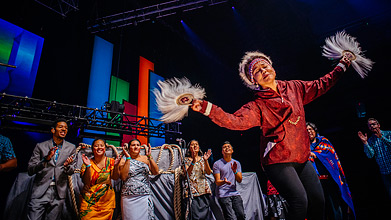You have been fearfully and wonderfully made (Psalm 139; Genesis 1:26). But you have not been made in a vacuum. Whether or not you’re aware of it, who you are is intricately and uniquely linked to the communities you’ve been a part of (your family, your church, etc.). The worship style that resonates with you most deeply—your worship story—comes out of these communities.
As we continue to learn to worship through the songs, languages, styles, and musical genres of different communities, we have to begin by understanding what is unique and good about our own ways of worshipping.
If we are unaware of our own worship story, we run the risk of falling into two opposite extremes: On one extreme, we’ll treat our own worship story as the norm and other worship stories as abnormal, inferior, and worthy of suspicion. Without realizing it, we create structures that assimilate people into our way of doing things and ignore the gifts that come from other communities.
On the other extreme, ignorance of our own worship story can lead us to overlook the ways God has shaped us and to instead treat others’ worship stories as superior to our own. Without realizing it, we embrace the styles and traditions of others, but look at our own culture with insecurity, judgment, and even hatred.
How to appreciate your own worship story:
- Take the online worship survey at Diverse Worship Matters to better articulate what makes your worship story unique.
- Interview community leaders to learn more about the community’s worship story, or read books that explain the history and background of your worship story.
- Discuss and share the similarities and differences of your worship stories in community.
- Prayerfully thank God for the unique aspects of your worship story.
- Write thank you notes to the people and communities that have shaped your worship story.
- Host a worship potluck, where members of your community can share their favorite songs and styles of worship and the stories behind them.
Worshipping at Urbana is like eating at a diverse and delicious buffet. I love buffets, but approaching diverse worship like a buffet can have a negative side. At buffets, we pick and choose what we want to eat, favoring some foods and ignoring others. We eat on our terms, according to our tastes and comforts.
There’s nothing wrong with having preferences in worship (we all have them). But when our individual tastes and preferences dictate the manner, style, and content of our worship, we develop a myopic view of God, a shallow understanding of what it means to worship, and a consumer approach to missions.
As followers of Jesus called to make disciples of all nations, we must actively and intentionally reject a buffet mentality in our approach to musical worship and missions, and instead grow as cross-culturally open missionaries. And we can start the very next time we gather for musical worship.
How to receive new worship stories with open hearts and minds:
- Use resources like the Approaching Differences diagram to integrate skills and strategies for crossing cultures into your community’s musical worship practices.
- Encourage each other to ask questions and inquire before critiquing or judging different styles of worship.
- Visit communities where you can experience new and different worship stories, and read books and articles that explain the history and background of different styles of worship.
- Listen to worship music that is different from your home tradition.

When God wanted to expand the Church to the ends of the earth, God gave the first Christians the miraculous ability to speak in different languages. Acts 2:6 tells us that a diverse crowd gathered “because each one heard their own language being spoken.” It’s one thing to hear a message in someone else’s language, but it is infinitely more powerful to hear it in your own language—your heart language.
At Pentecost—and throughout the Scriptures—God has revealed himself as a God of intimate love for all peoples. Could we reveal this God to people from different ethnic and cultural backgrounds when they check out our gatherings?
How to practice hospitality in worship:
- Honor others’ worship stories by doing what you can. Learning to lead diverse worship is not easy, but just trying your best can communicate a lot.
- Ask the Lord for help and direction. Your community may be called to reach specific people and specific cultures in this season. Listen for God’s voice!
- Pick new songs. Play them before and after your gatherings. Integrate them into your regular worship repertoire. Take advantage of the Urbana 15 worship resources.
- Practice, prepare, and process together. Learning diverse worship styles takes time and intentionality. Start with new songs that are doable for your community. Create time and space for additional rehearsal and preparation so you can honor the stories, styles, and language of other cultures.
- Carefully prepare how you will introduce songs, especially to people who weren’t at Urbana. Encourage and help one another as you stretch yourselves as musicians and worship leaders.
- Make space to process when you lead diverse worship so that your whole community can learn and grow.

